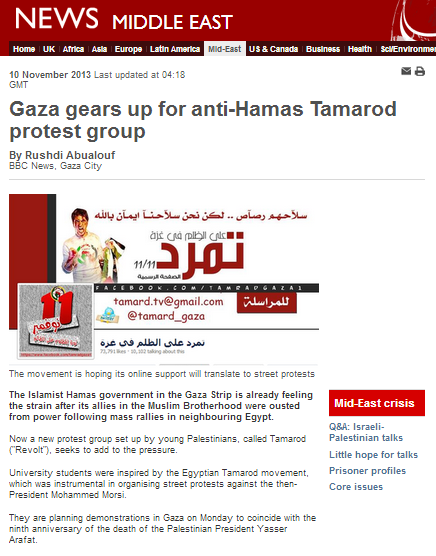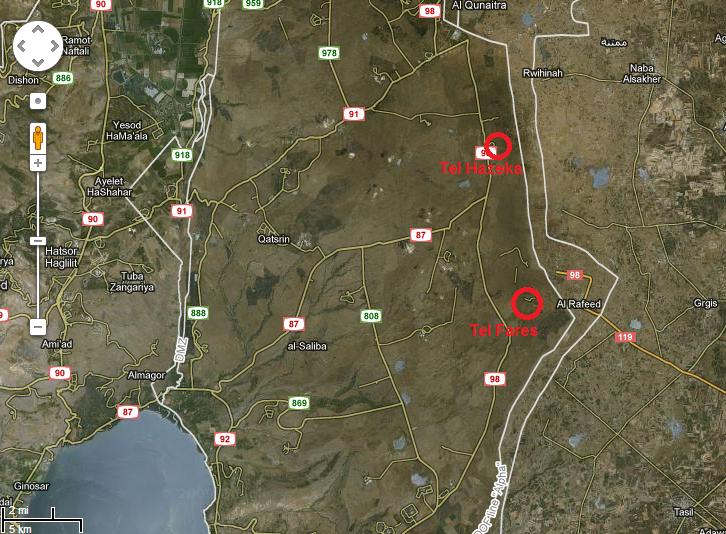Back in September the BBC News website misrepresented a domestic Israeli story about a budget disagreement between the Ministry of Education and institutions in the private schools sector. As was noted here at the time: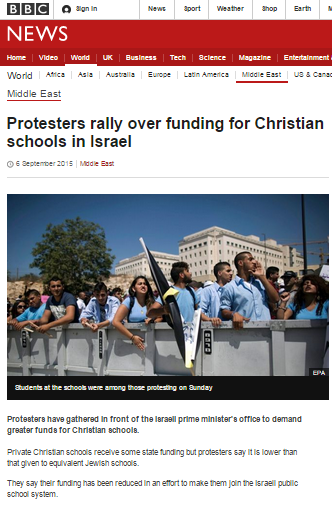
“So the take-away message in this article is very clear: readers are given to understand […] that there is discrimination against Christian Arabs in Israel in the form of lower funding for their schools in comparison to Jewish schools.”
As we also documented, the story in fact has nothing to do with discrimination.
“This story actually began in May 2013 when the Ministry of Education announced across the board budget cuts. Some of those cuts were made to the budgets of state schools and in addition, the Ministry of Education informed approximately 250 other schools of cuts to certain clauses of funding. Those schools are not state schools: they are private institutions categorized as ‘recognised but not official’ and they include, for example, some Jewish religious schools, some Christian schools, some Muslim schools and some schools from the Anthroposophic (Waldorf) and Democratic streams. In 2014 a petition from a number of those schools was heard by the Supreme Court – details of that case can be found here (Hebrew).
Whilst one can of course debate the issue of those budget cuts to the non-state school sector, what is clear is that they were made to private schools of many differing types in accordance with their classification and not – as overwhelmingly implied in this BBC article – because of the religion or ethnicity of their pupils.
In other words, the BBC has misrepresented this story in order to promote the false impression of discrimination against Christian Arabs by the State of Israel.”
Three months on, BBC Scotland has resurrected that inaccurate claim in a series of well-promoted reports by Fiona Walker.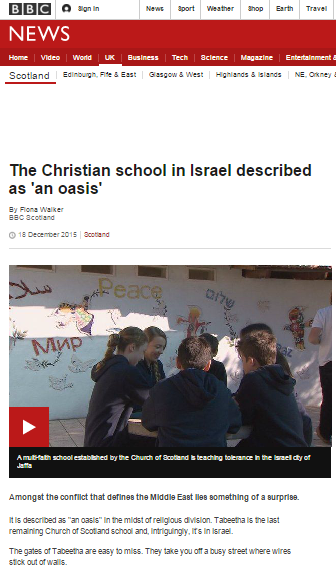
An article which appeared on the Scotland and Middle East pages of the BBC News website on December 18th under the title “The Christian school in Israel described as ‘an oasis’” (and by the way, that description comes from an official of the organisation running the school) informs readers that: [all emphasis added]
“Father Abdel Masih F Fahim represents Christian Schools in Israel. […]
Fr Abdel says funding to Christian schools from the Israeli government has been cut from 75% to 29% in recent years. He describes that as discrimination against Christians.
Fr Abdel is in talks with the Ministry of Education but says even 75% is discriminatory against 100% given to state schools.”
Further comment from the Middle East secretary for the Church of Scotland, Kenny Roger, is supplied:
“Although discussions with the Israeli government are showing signs of hope, he says he feels Christians are being marginalised.”
This report includes a response to those claims from the Israeli government – although one which BBC audiences would be likely to have difficulty understanding unless they had prior knowledge of the Israeli education system.
“The Israeli Ministry of Education said: “The Tabeetha school is under the status of a ‘recognised but not official’ institute, and therefore it is funded like all other schools in Israel that are recognised but unofficial, meaning up to 75%.
“High-schools are funded like all other high-schools in Israel, at a rate of 100%.””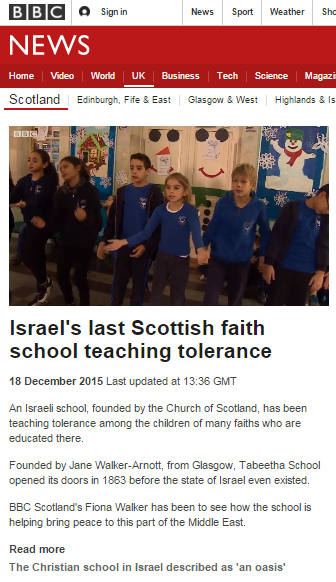
However, a filmed version of Walker’s report – apparently shown on BBC 2 and also posted on the BBC News website’s Scotland page under the title “Israel’s last Scottish faith school teaching tolerance” – did not include a response from the Israeli Ministry of Education.
“But there are concerns for the future. The funding the school receives from the Israeli government has been cut dramatically. The Church sees that as discrimination against Christians.”
“We invited the Israeli government to respond but haven’t received a reply.”
Obviously a reply was received because it appears in the written version of the report published on the same day as the filmed item.
Two audio versions of Fiona Walker’s report were broadcast on BBC Radio Scotland’s ‘Good Morning Scotland’ programme on December 18th (at 01:42:00 here) and on December 20th (at 01:30:56 here).
In the earlier programme listeners heard presenter Gary Roberts state in his introduction that “the school has become embroiled in religious regional politics” and Walker repeated that inaccurate messaging.
FW: “Tabeetha has become embroiled in the religious politics too. There have been Christian-run schools in the area for four centuries but the funding the school gets from the Israeli government has been cut drastically over recent years. Discussions with the government are ongoing but Kenny Roger at the Church of Scotland says their actions amount to discrimination against Christians.”
Listeners then hear Rogers say:
“We are being marginalized. Whether the word is discrimination, whether the word is marginalized, at the end of the day the Christian schools were not being given and are not being given the same funding as the other schools…”
With regard to the school’s multi-cultural ethos, Rogers goes on to claim that “by the funding difficulties, the message we get [from the Israeli government] is that doesn’t matter”.
Walker also tells listeners to this report that “we invited the Israeli government to respond but haven’t received a reply” even though the written version of the report published on the same day includes that reply.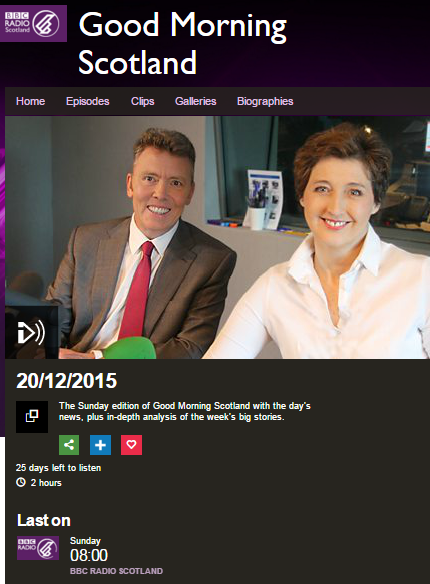
In the much longer version of the report broadcast on BBC Radio Scotland on December 20th the Israeli government response appears right at the end of the item. In the introduction to the item listeners are told that:
“The school has also become embroiled in the region’s politics with questions over funding causing staff to strike at the start of the academic year.”
They later hear versions of the same messaging found in the three previous reports.
Walker: “…there’s also a funding issue and it’s not just Tabeetha school which is affected.”
Fr. Abdel Masih Fahim: “The Israeli government gives every recognized school money to teach the official curriculum. That has historically been 75% of the costs but that has changed. […] Every year they cut some budget until we arrive at 29% of the right of the student. I see it like discrimination and not equal. So we are looking for equality with other students in the official schools in the system, in the rights of the teachers, in the rights of the schools and in the budget.”
Kenny Roger: “Whether the word is discrimination, whether the word is marginalized, at the end of the day the Christian schools are not being given the same funding as the other schools and that therefore causes a problem […] And so I think by the funding difficulties we still face the message we get [from the Israeli government] is that [multicultural ethos] doesn’t matter.”
Fr. Fahim: “We are in a Jewish state – what it means? Jewish state is only for Jewish people? Or Jewish state for everybody – Israeli state, Israeli…eh….Israeli….eh….country. So Jewish state it means Jewish can be here. And all others – Christians and Muslims – will be guests. But they are [unintelligible] from here; they are native of this land.”
FW: “So what message do you think the Israeli government is giving about their treatment of Christians and multi-faith organisations?”
Fr Fahim: “I was feeling that since we are minority we are treated like that.”
There are plenty of additional issues arising from these four reports including repeated evidence-free claims about discrimination against the Church of Scotland’s pupils at a choral event at the Presidential residence and a youth being apprehended for wearing a gold necklace. Kenny Roger’s promotion of the inaccurate notion of “1967 borders” in the second audio report is not challenged by Walker and neither are the simplistic attempts to portray Zionism and the Balfour Declaration as the root of the Arab-Israeli conflict by a Church of Scotland official.
The producers of this programme apparently did not find it inappropriate to promote the opinions of the same official – BDS supporter Rev. Páraic Réamonn – as he twice laid out his vision for a foreign country with more than a whiff of offensive and anachronistic British colonialism.
“Within the walls of the school we try to model the kind of community that we would like to see in this country. We would like to see Arabs and Jews, Palestinians and Israelis, living at peace with each other in a way that is fair and equitable and honest. But when the kids go out of the school or when they finish school they find themselves in a society that isn’t like that.”
Remarkably, whilst all four of these reports heavily promote the Church of Scotland and its views, at no point are BBC audiences told of that church’s political agenda relating to Israel and Judaism or made aware of the past controversies arising from that agenda.
But the central issue with all these four reports is that they blatantly misrepresent a disagreement about funding in order to promote the false – and politically motivated – notion of deliberate discrimination against Christians by the Israeli government. Clearly readers, viewers and listeners to these four reports need to be provided with a swift correction to the inaccurate impressions they have been fed.
Related Articles:
BBC & Angus Roxburgh promote the Church of Scotland narrative on the Middle East
Resources:
BBC Scotland contact details

